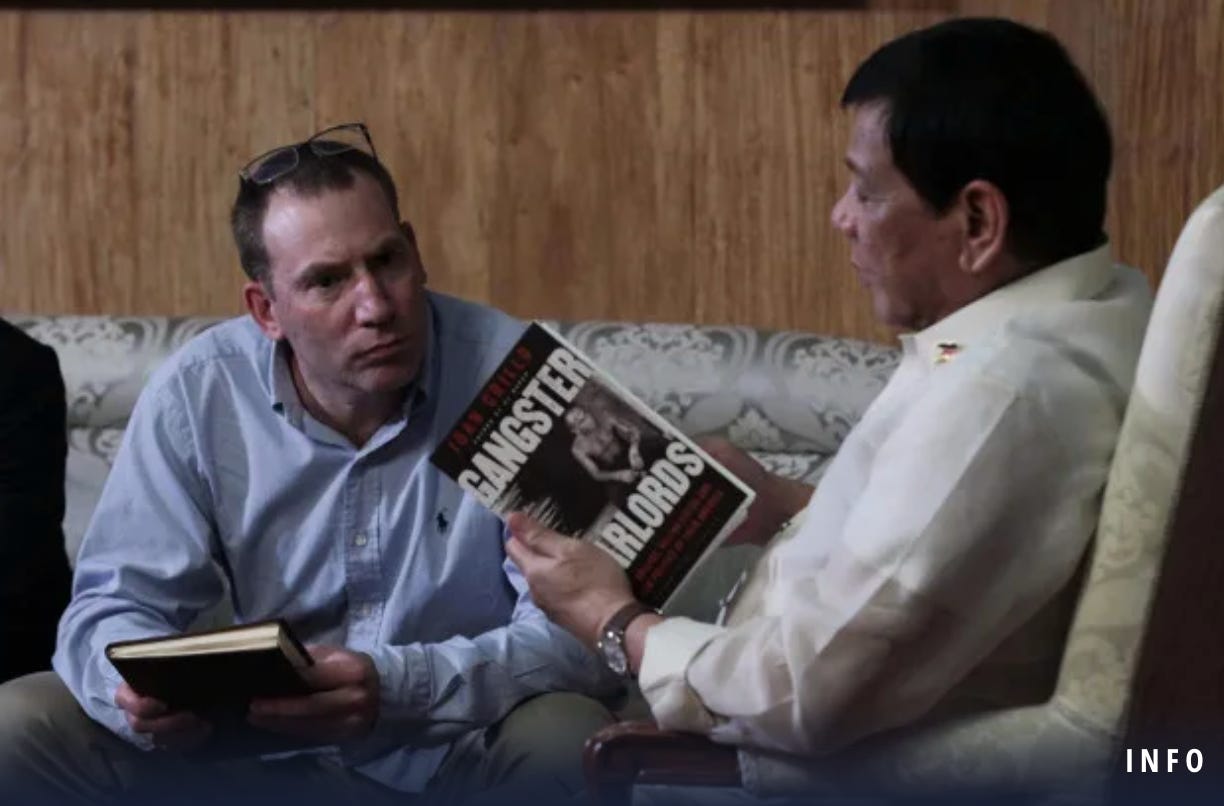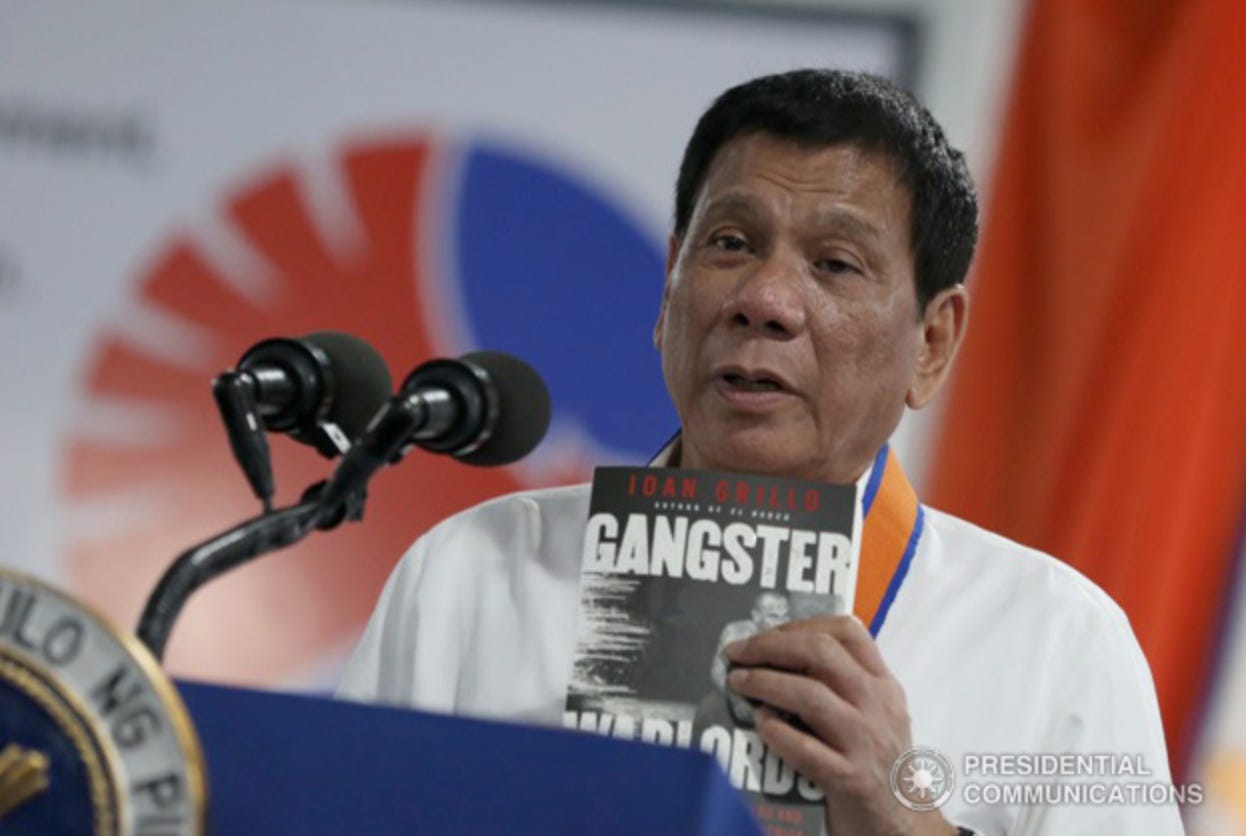My Reader, "The Punisher" Duterte
I sat down twice with the president of the Philippines; it was one of the most challenging situations I've had as a journalist and I only now tell the story PART 1
Para leer en español click aquí.
“It’s fun to kill…”
The face of Philippine President Rodrigo Duterte lit up as he talked to me in his presidential palace in Manila in 2016, making him look youthful, defying the fact he was in his seventies. His boyish appearance was accompanied by a charisma that made him seem like someone I had met before, an old friend – even if he was talking about homicide.
“It’s fun to kill,” he said, “especially if it’s a legal way. Not everybody is given a chance to kill an idiot.”
I was asking about his crackdown on crystal meth dealers that critics alleged included thousands of extra-judicial killings, murders they argued that should put him before the International Criminal Court (where he now faces trial). Duterte retorted that his war on drugs was saving his people from the ravages of crime and addiction.
“At the end of the day, whether you go to jail or go to hell, you are responsible for the welfare of your country. So me, they say that you go to hell, you go to prison, so be it…You keep on trafficking drugs, one day you will get into trouble with the police, and you will die.”
As I nodded along, I felt deeply conflicted and nerves gripped my stomach. Duterte had praised my reporting on drug cartels in Latin America, and even given copies of my book Gangster Warlords to his officer corps.
“This is the way the South American countries failed and fell one by one,” he said at a ceremony as he held my book in the air.
He declared he wanted to save the Philippines from a similar fate, so my books, including interviews with cocaine traffickers and their serial-killer hit men, provided a cautionary tale. When I walked through the palace, members of his staff took selfies with me and asked me to sign copies. As a freelance journalist, suddenly having a president of a country of over 100 million people praising you is a big boost.
Talking to people on the Philippine streets it seemed everyone was singing Duterte’s praises and his approval rating hit over 80 percent amid his war on drugs. Yet, this was no Nelson Mandela I had as a reader.
Duterte’s critics, including journalists, human rights defenders and priests, said he was orchestrating mass murder and shedding blood of the innocent. And Duterte gained infamy for a series of incendiary comments. He compared himself glowingly to Hitler, joked about the gang rape of a missionary, and was reported to call the Pope and President Barack Obama “sons of whores.” (He claimed there was a misunderstanding.) His nicknames included “The Punisher” and “Duterte Harry.”
My books went deep into the terror unleashed by cartels, the mass graves, beheading, kidnapping, the way that regular people suffered so much pain, which I could see would chime with Duterte. But I concluded with calls for social work to steer poor youths away from cartels, drug policy reform to reduce the black market, and building effective police. I hadn’t called anywhere for death squads!
I met Duterte twice, in 2016 and 2017, recording a couple of hours of conversation with him and was given access to the colorful characters in his court, a muscular police chief known as The Rock, a sexy pop dancer Mocha Uson who ran his social media, and I saw his then friend, the boxer Manny Pacquiao, in the Senate. I also interviewed his fiercest critics and hit the streets to talk to meth dealers, assassins and the families of those killed. And I got to the city of Marawi to see his soldiers fighting a full blown uprising by the Islamic State.
I found a country in the cross hairs of core conflicts tugging at the world today: the rise of populism, global organized crime, and radical Islam. And in Duterte, I saw a man who exemplifies the contradictions of our era, at once charismatic and coarse, sensitive to the desires of the poor, yet unflinching in releasing violence in poor neighborhoods.
“I do not allow my country to go to the dogs,” he told me. “I will kill you if you destroy my country. And I will kill you if you deprive us of the next generation.”
I wrote a draft of this article after the interviews and had a magazine ready to publish, but I pulled out at the last moment and it is only now that I finally tell this story. Back then, I felt highly conflicted with the situation, especially when Duterte told me…
Sorry folks, you need to subscribe to read this story. But it’s only the price of a cuppa coffee and you get the complete archive including exclusive interviews with top players and maps of cartel territory. And now is a great time to subscribe as we will be following these issues with detailed reports you can trust as big things break in the coming months.



